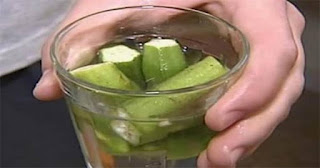OKRO: What you Don't Know About This Plant
Okra or OKRO,(English name is ladies' fingers or ochro), is a flowering plant in the mallow family. It is valued for its edible green seed pods. The geographical origin of okra cannot be placed, however, it is basically from the West Africa and some parts of Asia. The plant is cultivated in tropical, subtropical and warm temperate regions around the world. The word okra is from the Igbo ọ́kụ̀rụ̀ while the Yorubas call it their native name "ìlà".
I remember while growing up, it was planted in my compound, and I kept on wondering why this so called plant takes forever to bring out seedlings. It was later I found out that the species is a perennial crop, and often grows to be quite tall. It is related to such species as cotton, cocoa, and hibiscus.
Okro/Okra contains about 138KJ of Energy, Carbohydrates, Sugars, Dietary fiber, Fat of about 0.19g, Protein about 1.9g. It also contains various Vitamins like Vitamin A, Thiamine (B1), Riboflavin (B2), Niacin (B3), Folate (B9) Vitamin C of about 28% which is also known as ascorbic acid, necessary for the growth, development and repair of all body tissues, immune system, wound healing, and the maintenance of cartilage, bones, and teeth. Vitamin E, Vitamin K of about 30% responsibile for blood clotting, bone metabolism, and regulating blood calcium levels in the body.
OKRO also contains Minerals like Calcium of about 8%, Iron, Magnesium of about 16%, Phosphorus, Potassium, Zinc, and 89.6g of Water (90%).
After knowing the nutritional value of this plant, let's take a look at the health benefits.
Okra Benefit #1: Dietary Fiber
Okra is high in fiber. Eight medium-sized pods are estimated to contain 3 grams of fiber. This bulk fiber quality has several benefits. It helps digestion, cuts hunger cravings, and keeps those who eat it fuller for longer. Foods that are high in fiber content are an important part of dietary treatment options for diabetes.
Okra Benefit #2: Anti-Stress Effects
There is evidence that the seed extracts of okra have an antioxidant, anti-stress effect in the bloodstream. Managing stress levels is an important part of managing diabetes. Long-term, high stress levels can cause blood sugar levels to spike.
Okra Benefit #3: Lower Cholesterol
Okra has been found to lower cholesterol levels. Foods with high fiber content and antioxidant qualities are recommended for those with diabetes because they lower cholesterol.
Okra Benefit #4: Anti-Fatigue Benefit
One study indicates that recovery times and “fatigue levels” can be improved by use of the okra plant. By including okra in your diet along with a healthy exercise routine, you may be able to work out for longer and recover more quickly from your exercise. Cardiovascular activity is an essential part of preventing and treating diabetes. This means that the okra plant may contribute to a more active lifestyle.
Okra Water
Drinking “okra water” is a popular new method of using okra. Some have even suggested that drinking it helps lessen diabetes symptoms. The drink is made by putting okra pods in water and soaking them overnight. Some of the valuable nutrients in the skin and seed pods will be absorbed into the water. If you’re not crazy about the taste of okra, drinking this okra water solution is a quick and simple way to derive the benefits of okra without eating it.
Some people prefer to cut the okra into thin slices instead of soaking the pods whole. If you are going to prepare okra water this way, be prepared for a drink that is slightly bitter.
Okra peel is the most traditional way to use okra medicinally and nutritionally most especially here in Nigeria. In the preliminary studies done to investigate the benefits of using okra, using shredded okra peel was seen to be the most favourable way to ingest it. You can prepare okra peel yourself by using a handheld kitchen grater
The gel inside of okra is a thickening agent, making it a common ingredient in some soups and stews.
Okra leaves may be cooked in a similar way you cook your vegetables like green, ugwu, etc, at least it's one thing I remember my grandma prepared the first time she came visiting. The leaves are also eaten raw in salads. Okra seeds may be roasted and ground to form a caffeine-free substitute for coffee.
In summary,
- The lubricating properties of the Okra has a good laxative effect which helps to prevent constipation.
- In addition, this plant gives the body a charge of energy, makes one stronger, get rid of depression, promotes rapid healing of ulcers, and maintains healthy joints.
- There is a lot of magnesium in the Okra capable of eliminating asthma and muscle cramps.
If you don't know, now you know! So hence, once in a while include okro in your meal and pot of soup. The interesting thing is, it goes with any solid food you can think of (eba, amala, fufu/apu, semo, wheat, etc), if you now add irú (locust bean), chai!, just be careful not to bite your tongue 😝... Lol.
And for those that says it reduces the sexual performance in men, not when it is taken once in a while! Just as I shared with you about this time last year the benefits of Jute leaf (popularly known as ewedu), which I know some people are really enjoying the exposé from feedbacks, I hope you try this out too and enjoy it nutritional value as sometimes it's good to try out something new.
Happy Weekend!
#Brightcares
#Brightcares







Comments